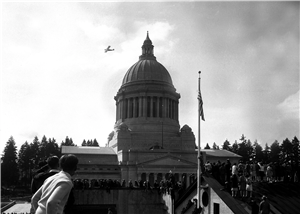On September 14, 1927, famed aviator Charles Lindbergh in his plane Spirit of St. Louis flies over the Capitol Dome in Olympia. Lindbergh is on a cross-country trip to promote the U.S. Air Mail Service. On his way from Seattle to Portland, Lindbergh has agreed to make a side-trip to Olympia, responding to a request from Tumwater businessman Peter G. Schmidt. Lindy’s visit eventually provides the impetus for the construction of the Olympia Regional Airport.
Lindbergh’s Fame
Charles Lindbergh (1902-1974) had on May 21, 1927, completed the first solo, non-stop transatlantic flight, from New York to Paris. When he returned home from Europe, he was awarded the Orteig Prize, an accompanying $25,000 check, the Medal of Honor (America’s highest military decoration), and worldwide recognition. He used his newfound fame to promote one of his pet projects, the U.S. Air Mail Service. And promote he did, piloting his plane Spirit of St. Louis on an air tour lasting more than three months and covering 48 states, Washington included.
In early September 1927, Tumwater businessman Peter G. Schmidt was chairing the aviation committee of Olympia’s Chamber of Commerce. Schmidt had previously headed the Olympia Brewing Company until Prohibition shuttered the beer industry. He then shepherded his family and stockholders into a series of business ventures, including ownership of several upscale hotels throughout the Northwest. Schmidt knew that in just a few days, "Lindy" was due to fly from Seattle to Portland. Schmidt saw an opportunity for Olympia’s citizens to share in the fervor of Lindbergh's air tour. So he telegraphed Seattle Mayor Bertha Landes (1868-1943), asking her assistance in persuading Lindy to deviate from his course by just a few miles for a fly-by of the state capitol buildings. Landes lent enthusiastic support to the idea. Schmidt sent a similar telegram directly to Lindbergh.
Olympia Mayor James C. Johnson also telegraphed the famous aviator: "On behalf of the citizens of the capital city I extend to you an invitation to kindly fly over our city and the beautiful capitol buildings on your trip from Seattle to Portland. Our entire citizenship is greatly interested in your flight and the great work you are doing" ("Lindbergh May Fly …").
A Perfect Day for Flying
Lindbergh readily agreed to fly over the State Capitol building, still under construction, especially when he learned that schoolchildren would be present. On the morning of September 14, schools released students from classes. Local residents crowded the roofs of the major buildings in town. The fire department stood ready to herald Lindbergh's approach with six long blasts on the fire siren. The Morning Olympian newspaper waxed dramatic in describing the scene:
"It was only for a moment that the Spirit of St. Louis and its pilot hovered over Washington’s seat of government but in that time every capacity for hero-worship, every depth of adulation within the city and its people was touched to its bottom-most point as a united populace glimpsed for a moment America’s outstanding hero of this age, and voiced all that it could offer in terms of praise.
"Flying graceful as a bird on wing, he came out of the north, travelling at a high speed, and straight as an arrow, he shot toward the capitol dome, dipped and circled. A warm sun beat down out of a clear sky. A lazy breeze lifted out of the southwest, stirring the flags on the capitol group and the high school. It was a perfect day for flying. The crowd at the capitol grounds recognized the monoplane which had carried the Norseman of the Air across the sea to France, and began shouting and waving. Lindbergh swung off away from the capitol and darted over the city, lingered for a moment and came back. On his second trip he maneuvered for position, dipped and dropped a message of greeting, addressed to the city of Olympia. Lifting, he circled to the right, straightened out, and disappeared ..." ("Lindy Salutes ...").
Message from Lindy
On the ground, Lindbergh’s message was held aloft for half an hour while throngs of adults and children crowded close to read the words signed by Lindy himself:
"Because of the limited time and the extensive itinerary of the tour of the United States now in progress to encourage popular interest in aeronautics, it is impossible for the 'Spirit of St. Louis' to land in your city.
"This message from the air, however, is sent to you to express our sincere appreciation of your interest in the tour and in the promotion and expansion of commercial aeronautics in the United States. We feel that we will be amply repaid for all our efforts if each and every citizen in the United States cherishes an interest in flying and gives his earnest support to the air mail service and the establishment of airports and similar facilities. The concerted efforts of the citizens of the United States in this direction will result in America’s taking its rightful place within a very short time as the world leader in commercial flying" ("Lindbergh’s Message …").
Lindbergh's visit was over quickly, but it had long-term consequences. Although a small, rustic airfield had existed south of Tumwater since about 1911, Lindbergh's famous fly-over and support from Schmidt and other influential community members spurred the City of Olympia to purchase the airfield property in 1928. The city soon started improving the field by paving runways and taxiways and building hangars and offices. Today, Olympia Regional Airport proudly claims to be "among the oldest public airports in the United States" ("Port of Olympia").

